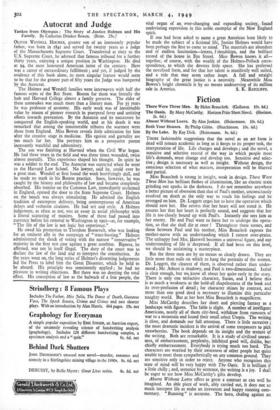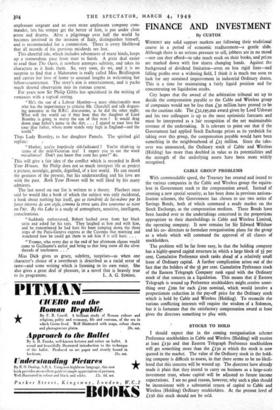Fiction
THOSE fashionable suggestions that the novel as an art form is dead will remain academic as long as it keeps to its proper task, the interpretation of life. Life changes and develops ; and the novel, a sensitive and selective record of the way in which people meet life's demands, must change and develop too. Sensitive and selec- tive ; design is necessary as well as insight. Without design, the conscious selection of what matters, interpretation will be blurred and partial.
Miss Beauclerk is strong in insight, weak in design. There Were Three Men has brilliant flashes of illumination, like an electric train grinding out sparks in the darkness. I do not remember anywhere a better picture of obsession than that of Paul's mother, unconsciously resolved on death as the only way to reach his feelings and be revenged on him. Dr. Loggett urges her to have the operation which should save her. She retorts that her heart will not stand it. He assures her that her heart is perfectly sound, and suggests that her life is too closely bound up with Paul's. Instantly she sees him as her enemy. He and Paul want to force her to undergo the opera- tion, so that she shall die at once ! Throughout these scenes, and those between Paul and his mother, Miss Beauclerk exposes the mother-nerve with an understanding which I cannot over-praise. The unhappy fool Mrs. Uanwell becomes a universal figure, and our understanding of life is-deepened. If all had been on this level, we should be acclaiming a masterpiece.
But the three men are by no means so clearly drawn. They are little more than nails on which to hang the portraits of the women. Dr. Loggett, the clearest of them, is observed rather than under- stood ; Mr. Ashcot is shadowy, and Paul is two-dimensional. Isabel is clear enough, but we-know all about her quite early in the story. There is only one attractive character, Susan, and I believe this is as much a weakness as the hold-all shapelessness of the book and its over-profusion of detail ; for character shines by contrast, and more than one good deed is necessary to illumine this particular naughty world. But at her best Miss Beauclerk is magnificent. Miss McCarthy describes her short and piercing fantasy as a landscape with figures. The fable is slight. A number of intelligent Americans, nearly all of them city-bred, withdraw from rumours of war to a mountain and found their small select Utopia. The writing is close, and demands our full attention. There is little narrative ; the most dramatic incident is the arrival of some trespassers to pick strawberries. The book depends on its insight and the texture of the writing. Both are remarkable. It is a study of civilised uneasi- ness, of embarrassment, perplexity, inhibited good will, dislike, but chiefly embarrassment. Everybody is trying much too hard. The characters are worried by their awareness of other people but quite unable to meet them sympathetically on any common ground. They are sensitive only in order to reject. Anyone who recognises this state of mind will be very happy with The Oasis. It is brilliant if a little chilly ; and, sentence by sentence, the writing is a joy. I shall be eager to see how Miss McCarthy's gifts develop. Absent Without Leave offers as great a contrast as can well be imagined. An able piece of work, ably carried out, it does not so much interpret life as make an irreverent and happy running com- mentary. " Running" is accurate. The hero, chafing against an
unpleasant sergeant and an even more unpleasant company com- mander, lets his temper get the better of him, is put under close arrest and deserts. After a pilgrimage over half the world he becomes involved in the invasion of Italy, distinguishes himself, and is recommended for a commission. There is every likelihood that all records of his previous misdeeds are lost.
This cheerful tale, which includes adventures of many kinds, keeps up a tremendous pace from start to finish. A great deal easier to read than The Oasis, it nowhere attempts subtlety, and takes its characters as it finds them. So, very. soon, do we, and it is no surprise to find that a Maharanee is really called Miss Bridlington and carries her love of home to unusual lengths in welcoming her fellow-countrymen. The story's aim is entertainment, and it packs -much shrewd observation into its riotous course.
For years now Sir Philip Gibbs has specialised in the writing of romances with a topical setting.
" He's the son of a Labour Member—a most objectionable man who has the impertinence to criticise Mr. Churchill and talk disgust- ing nonsense in the B.B.C. discussions, as he did the other night. What will the world say if they hear that the daughter of Lord Bramley is going to marry the son of that man ? It would drag down your father's name to the dirt.. . . I appeal to your love for your dear father, whose name stands very high in England—and the world."
Thus Lady Bramley, to her daughter Pamela. The spirited girl replies:
"Mother, you're hopelessly old-fashioned You're thinking in terms of the mid-Victorian era! I expect you to use the word misalliance! Don't you know that caste has gone?" &c.
This will give a fair idea of the conflict which is recorded in Both Your Houses. Sir Philip does not so much interpret life as project a picture, nostalgic, gentle, dignified, of a lost world. He can record the gestures of the present, but his understanding and his love are with the past. Both Your Houses will be well liked by his many admirers.
The last novel on our list is written to a theory. Flaubert once said he would like a book of which the subject was only incidental, a book about nothing but itself, qui se tiendrait de lui-rnime par la force interne de son style, comme la terre sans etre soutenue se tient en Pair. By the Lake is a study of atmosphere, sensitive, intelligent, conscientious.
"-Suddenly embarrassed, Robert backed away from her black satin and asked for his toys. They laughed at him and with hint, and he remembered he had hurt his knee jumping down the three steps of the Paris-Geneva express at the Customs that morning and wondered how he could get them to ask him if it still hurt. . . .
" Yvonne, who every day at the end of her afternoon classes would come to Guillaume's atelier and bring to that long room all the silver threads of tenderness. . . ."
Miss Dick gives us grace, subtlety, surprises—as when one character's choice of a sweetheart is described as a racial error of taste—and some writing which is listening to its own voice. She also gives a great deal of pleasure, in a novel that is bravely true







































 Previous page
Previous page